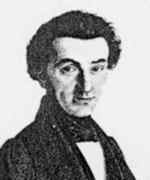Person: Scherk, Heinrich Ferdinand

Heinrich Scherk was a mathematician born in what is now Poland who discovered an important example of a minimal surface.
Mathematical Profile (Excerpt):
- Scherk completed his school studies in 1818 and entered the University of Breslau.
- It was H W Brandes who taught him mathematics and astronomy at the University of Breslau, and quickly realised that Scherk had an outstanding pupil.
- This made Scherk financially secure for the two years of its duration, and allowed him to devote himself fully to his studies.
- Scherk's doctoral studies, in which he was advised by Bessel and Brandes, led to him submitting his doctoral thesis De evolvenda functione ...
- After two years as a privatdozent in Königsberg, Scherk was appointed as an extraordinary professor in Halle.
- Scherk taught at Halle for seven years from 1826 to 1833.
- Remarkably over 11,000 mathematicians can trace their academic parentage back to Scherk through Kummer.
- At Halle, Scherk taught a wide range of courses such as: analytic geometry of lines and the conic sections; analytic geometry of lines and surfaces of the first and second degree; algebra and algebraic geometry; plane and spherical trigonometry; integral calculus; and differential calculus and its application to algebra, analysis and geometry.
- On 5 July 1831 Scherk was appointed to the chair of mathematics at Halle which had been vacant since the death of Johann Friedrich Pfaff in 1825.
- On 13 September 1833 Scherk was appointed as a successor to N T Reimer as the ordinary professor for mathematics and astronomy at the University of Kiel.
- In the years 1841, 1842 and 1848 Scherk was chosen as Rector of the University of Kiel.
- In 1840 Scherk was made a Knight of the Order of Dannebrog, the second highest honour in Denmark (Dannebrog is the name for the Danish flag).
- Bessel died in March 1846 and later that year, at the annual meeting of the Association of German Natural Scientists and Physicians in Kiel, Scherk gave a fine speech in his memory.
- Scherk, however, was a German patriot and one of the three supervisors of the first German sea-cadet school in Kiel set up in 1848, where he was head of mathematics training.
- It is clear, however, that Scherk's German patriotism was unacceptable in the now Danish Schleswig-Holstein.
- The Faculty of Philosophy at the University of Halle tried unsuccessfully to reappoint Scherk, and attempts at Kiel to have him reinstated in his former post were equally unsuccessful.
- In the autumn of 1852 Scherk left Kiel and went to Dresden where he gave private tuition at the Blochmann Institute.
- On 12 December 1854 Scherk was appointed as director of the Höheren Gewerbeschule in Bremen.
- In the following year Scherk was appointed as a teacher at the Handelsschule (part of the High School) in Bremen.
- We should also note that Scherk discovered the third non-trivial examples of a minimal surface which appeared in his paper Bemerkungen über die kleinste Fläche innerhalb gegebener Grenzen Ⓣ(Comments on the smallest area of a surface with given boundary) published in Crelle's Journal.
- Scherk's result was certainly seen as a major breakthough and brought him considerable fame; two surfaces, Scherk's First Surface and Scherk's Second Surface, as they are named today, are studied in the paper.
- Scherk's doubly periodic surface is the first example of a complete, embedded, doubly periodic minimal surface.
- His minimal surfaces have recently been the basis of sculptures by the American artist Brent Collins who has based many of his works on Scherk's second minimal surface.
- Another contribution by Scherk is still important today, namely his work on the distribution of the prime numbers.
Born 27 October 1798, Posen, Prussia (now Poznań, Poland). Died 4 October 1885, Bremen, Germany.
View full biography at MacTutor
Tags relevant for this person:
Astronomy, Origin Poland
Thank you to the contributors under CC BY-SA 4.0! 

- Github:
-

- non-Github:
- @J-J-O'Connor
- @E-F-Robertson
References
Adapted from other CC BY-SA 4.0 Sources:
- O’Connor, John J; Robertson, Edmund F: MacTutor History of Mathematics Archive
